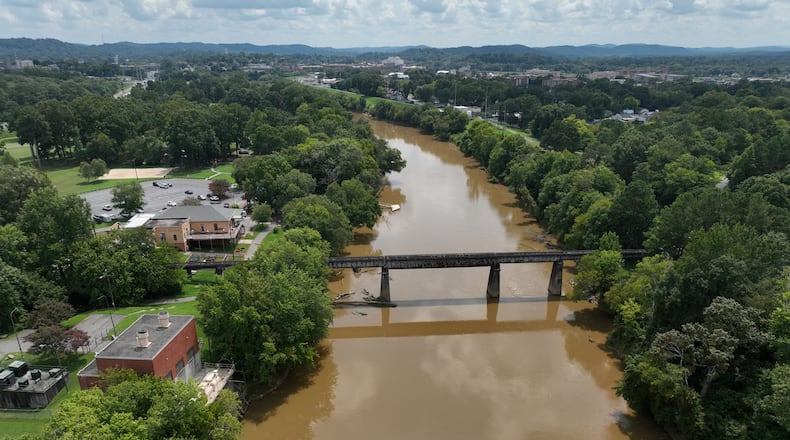A recent settlement reached by the city of Rome in its dispute over “forever chemical” discharges by neighbors upstream will allow it to build a new, $100 million water treatment plant at no cost to residents, the city’s attorney announced Tuesday night.
The agreement will also pay for the facility’s operating costs. On Tuesday, Rome’s City Commission voted to approve the settlement and roll back water rate hikes that were in effect to pay for the plant.
The news that the case had been resolved days before it was set to go to trial was revealed earlier this month. But the details released Tuesday shed more light on the agreement, which comes as other “forever chemical” cases in Georgia and other states remain unresolved.
Rome’s City Manager Sammy Rich said in a statement that the settlement “represents a huge win for the entire community.”
Credit: HYOSUB SHIN / AJC
Credit: HYOSUB SHIN / AJC
Rome’s lawsuit had pit the city against its neighbors to the north in the flooring industry around Dalton — known as the “carpet capital of the world” — over their use of chemicals known as per- and polyfluoroalkyl substances, or PFAS.
New research has led to increasing concern about the health and environmental impacts of the chemicals.
The agreement resolves Rome’s claims against 32 of the defendants in the case. The city attorney, Andy Davis, told the Rome City Commission that settlements with five remaining defendants are still pending. Davis said he expects those to be finalized in September.
The precise amount of Rome’s settlement was not revealed Tuesday due to confidentiality agreements.
Rome’s lawsuit took aim at the city of Dalton’s electricity, gas, water and wastewater utility — Dalton Utilities — plus flooring manufacturers Shaw and Mohawk Industries, chemical giants 3M and Chemours and others. The plaintiffs said Dalton Utilities had received PFAS-laden wastewater for years from carpet plants in the region, but that its treatment processes failed to remove the chemicals.
For years, the utility has sprayed wastewater on a 9,600-acre “land application site.” Testing conducted by Rome’s expert witnesses showed that enormous PFAS concentrations have accumulated on the property. The suit alleged that runoff from the site was sending dangerous amounts of the chemicals downstream into the Oostanaula River, Rome’s main drinking water supply.
In 2016, in order to meet new federal drinking water standards, Rome stopped drawing water from the Oostanaula and began temporarily relying on a smaller pump station on the Etowah River. To pay for a permanent solution to its problem — a reverse-osmosis water treatment plant — Rome had raised residents’ water rates by 9% annually through 2025, with additional 3% hikes set to kick in for six years after that.
The nearby city of Gadsden, Alabama, — which settled a lawsuit last year against some of the same defendants as the Rome case — is also building a reverse-osmosis plant to remove PFAS from its water.
Credit: HYOSUB SHIN / AJC
Credit: HYOSUB SHIN / AJC
Rome’s suit sought to hold the plaintiffs responsible for paying for the plant, remediation of the land application site and other damages.
Requests for comment sent to Chemours, Dalton Utilities, Mohawk Industries and Shaw were not immediately returned.
Carolyn LaViolette, a spokeswoman for 3M — which is among the five defendants whose agreements with Rome are still pending — said in a statement that the company is working with the city to resolve its claims.
“We will continue to fulfill our PFAS remediation commitments and address litigation by defending ourselves in court or through negotiated resolutions, all as appropriate,” LaViolette added.
The settlements prevent the city from disclosing the exact dollar amount it was awarded, Rome’s attorney Andy Davis told the commission Tuesday. Davis added that some of the defendants — who are facing other PFAS lawsuits in Georgia and beyond — do not want the information to become public. The Atlanta Journal-Constitution has submitted an open-records request to obtain the full settlement details.
“Forever chemicals” have been used for decades to add oil-, water-, and heat-resistance to dozens of products — from pans and food wrappers to fabric and carpets. Their resistance to break down in nature means traces can be found nearly everywhere on Earth.
PFAS also accumulate in the human body. A mounting body of evidence has linked the chemicals to an array of illnesses: cancers, immune system suppression, elevated cholesterol and decreased infant and fetal growth. New research has shown negative health impacts can occur with much smaller exposures than previously known.
Earlier this year, the Environmental Protection Agency (EPA) proposed new drinking-water standards for perfluorooctane sulfonic acid (PFOS) and perfluorooctanoic acid (PFOA), two “forever chemicals” linked to a host of health conditions. Manufacturers have stopped using the two chemicals, but they can persist in the environment for decades.
If the lower federal limits are finalized, more Georgia cities could also face expensive water-system upgrades to comply.
Other major cases involving PFAS pollution in Northwest Georgia, meanwhile, are still unresolved.
A lawsuit filed by Rome resident Jarrod Johnson is seeking class-action certification with other Rome water customers, but the U.S. District Court overseeing the case has not ruled on that request. On Tuesday, Rome’s attorney Andy Davis advised the city’s water and sewer division not to issue refunds to residents for the higher rates they’ve been paying, in case the other lawsuit is successful.
Just northwest of Rome, a class-action lawsuit filed by a resident of Summerville and joined by the city itself is seeking to hold fabric manufacturers around Trion and chemical companies responsible for PFAS contamination in its water supply. A trial date has not been set in that case.
About the Author
Keep Reading
The Latest
Featured




